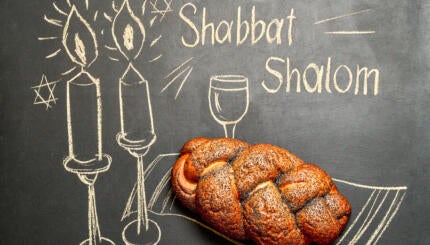I cannot remember exactly when my family began singing Eshet Hayil at the Friday night table. I do know that it was we, the kids, who brought this custom into the house. When I was 5 years old, my family moved to Toronto from Sarnia, a small town in Western Ontario where my father had owned a furniture store that was founded by his father, an immigrant from Galicia.
“Who had time in Sarnia,” recalls my father, “for a leisurely Friday night dinner? You had to rush home, eat quickly, and get back to the store.”
When my family moved to Toronto, however, all this changed. My father ceased working on Shabbat. We began attending Jewish schools and camps where we learned tefillot (prayers) and Hebrew songs.
Singing as a Renewed Commitment
When we first introduced the singing of Eshet Hayil at the Shabbat table, my father, who had received but a rudimentary Jewish education growing up in Sarnia, struggled with the complex Hebrew words, yet persisted in going through it every week. For our family, singing Eshet Hayil symbolized a renewed commitment to Jewish observance and the authentic calm of a leisurely Shabbat meal shared with the whole family. It stood for the realization of a Jewish Canadian/American dream, completely elusive to my grandfather’s generation: the possibility of earning a living while living as a fully observant Jew.
With your help, My Jewish Learning can provide endless opportunities for learning, connection and discovery.
Listen to Eshet Hayil (courtesy of Mechon Hadar)
The Origins of Eshet Hayil
Scholars say that the custom of singing Eshet Hayil at the Friday night table was initiated by kabbalists in the 17th century, who viewed Shabbat as an occasion of mystical union with the Divine. They understood Eshet Hayil allegorically as a representation of the Shekhina, the feminine presence of God. In a sense, we were living out our own contemporary allegorical interpretation of Proverbs 31, with the Woman of Valor being the Sabbath, whom we had welcomed, with renewed energy, into our midst.
There is allegory, and then there is literal reading. Singing Eshet Hayil was also an occasion to offer appreciation for my mother, who cooked, baked, and sewed, and had now prepared the Shabbat dinner that we so much enjoyed. The valorous woman in Proverbs 31 never sits still, let alone rests. Her light never goes out and she rises from her bed when it is still dark. Was that not just like my own mother, who teemed with nervous energy, walked more quickly than anyone else in the family, and had this uncanny ability to wake up in the middle of the night in response to the sound of my footsteps approaching my parents’ room?
Wonder Woman
Years later, as a mother, scholar, and feminist, I find myself returning to Eshet Hayil, wondering where I see myself in relation to this biblical uber-frau, who singlehandedly feeds her entire household, works her hands in wool and flax, clothes her children in crimson, all the while managing a business and various philanthropic endeavors. To what extent do any of us see ourselves in this A to Z list of what was valued in a woman in the biblical period? Are we amused by it or alienated?
In the context of our own times, when so many of us work outside as well as inside the home, negotiating on a daily basis a heroic set of professional as well as domestic duties, does Proverbs 31 provide inspiration or does it enshrine a set of unrealistic expectations? Nowadays, when husbands are more involved in child rearing, domestic chores, and Shabbat preparation, should they still sing this paean to their wives while wives sing nothing to their husbands? Given our awareness of the number of single women in our midst as well as couples and families who do not conform to this heterosexual norm, are we not concerned about trumpeting this image as an ideal?
In asking these questions, we exit the experiential mode in which the song wafts over us unthinkingly and begin a more critical set of deliberations that can lead to disgruntlement as well as rediscovery. What do we find when we look into the ways in which Jews read and understood this poem/song in the past? And what new readings can we offer as moderns and as feminists?
Eshet Hayil In Context
Many of us are acquainted with remarkable men and women, though, who possess amazing and numerous virtues that inspire us and even arrest our imaginations. As feminists, we may not thrill to the list of tasks and traits enumerated in the biblical acrostic that is Proverbs 31. Yet, I still cling to the scholarly mission of searching out outstanding women of the past as well as to the belief in the real possibility of contemporary women of valor, however we define the term. Once again, I refer to the issue of context.
We typically ignore the fact that the Eshet Hayil poem is preceded in Proverbs 31 by nine verses of instruction offered by an unnamed Queen Mother to her son King Lemuel, in which she warns him against drunkenness and debauchery (with women), encouraging him instead to judge righteously and be an advocate for the needy. One way to read the Eshet Hayil, poem, then, is as King Lemuel’s eulogy for his valorous and wise mother, bearing in mind the genre of the eulogy, which often includes hyperbole and sacralizing of the lost loved one.
We all know, of course, that it is best not to reserve one’s appreciation for that ultimate occasion. Instead, why not sing it each week to others as well as ourselves? This past Friday night, after completing a draft of this essay as well as a dizzying array of other home-related tasks, I giddily joined in the singing of Eshet Hayil, adding in my own extemporaneous musical list of my accomplishments and those of the people around me–my kids had been remarkably cooperative that Friday, my husband survived another week on Wall Street and had managed to get home just in time for candle lighting–to the praised attainments of yesteryear. A better way to begin my Shabbat, who can find?
Excerpted with permission from JOFA, The Jewish Orthodox Feminist Alliance.
Shabbat
Pronounced: shuh-BAHT or shah-BAHT, Origin: Hebrew, the Sabbath, from sundown Friday to sundown Saturday.



